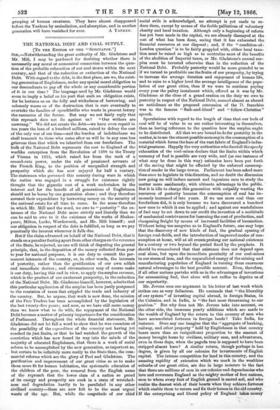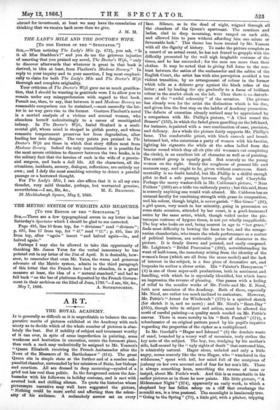THE NATIONAL DEBT AND COAL SUPPLY.
[To THE EDITOR OF THE "SPECTATOR."]
Slit,—Notwithstanding the great authority of Mr. Gladstone and Mr. Mill, I may be pardoned for doubting whether there is necessarily any moral or economical connection between the ques- tion of the probable exhaustion of our coal stores within the next century, and that of the reduction or extinction of the National Debt. With regard to the debt, in the first place, are we, the exist- ing generation of Englishmen, under any special moral obligation to our descendants to pay off the whole or any considerable portion of it in our time ? The language used by Mr. Gladstone would seem to imply a belief on his part that such an obligation exists, for he lectures us on the folly and wickedness of borrowing, and solemnly warns us of the destruction that is sure eventually to overtake the families of spendthrifts who waste in present luxury the resources of the future. But may we not fairly reply that this reproach does not lie against us? "Our withers are unwrung." We did not create the debt—we have even repaid in ten years the loan of a hundred millions, raised to defray the cost of the only war of our time—and the burden of indebtedness we shall transmit to those who come after us will be in any case less grievous than that which we inherited from our forefathers. The bulk of the National Debt represents the cost to England of the warlike enterprises from the Revolution of 1688 to the Treaty of Vienna in 1815, which raised her from the rank of a second-rate power, under the rule of pensioned servants of the French King, to the position of unequalled strength and prosperity which she has now enjoyed for half a century. The statesmen who governed this country during wars in which the nation was engaged in a struggle for existence rightly thought that the gigantic cost of a work undertaken in the interest and for the benefit of all generations of Englishmen should not be borne by one generation alone ; and they therefore covered their expenditure by borrowing money on the security of the national estate for all time to come. In the sense therefore in which Mr. Mill used the word, we owe to " posterity " the ex- istence of the National Debt more strictly and literally than we can be said to owe to it the existence of the works of Shakes- peare, Milton, Locke, Wordsworth, and Mr. Mill himself ; and our obligation in respect of the debt is fulfilled, so long as we pay punctually the interest whenever it falls due.
But if the claim advanced on behalf of the National Debt, that it stands on a peculiar footing apart from other charges on the revenues of the State, be rejected, no one will think of disputing the general principle, that, in the disposition of the money collected from year to year for national purposes, it is our duty to consult the per- manent interests of the country, or, in other words, the interests of posterity, rather than the gratification of our own selfish and immediate desires ; and circumstances may of course make it our duty, having this end in view, to apply the surplus revenue, which is the product of our exuberant prosperity, in the reduction of the National Debt. Mr. Gladstone himself, however, admits that this particular application of the surplus has been justly postponed to the remission of taxes that crippled the trade and industry of the country. But, he argues, that work is now done, the mission of the Free Traders has been accomplished by the legislation of the last twenty-five years ; and now, as we have still more money than we know what to do with, the repayment of the National Debt becomes a matter of primary importance for the consideration of Parliament. Throughout the whole financial statement, Mr. Gladstone did not let fall a word to show that he was conscious of the possibility of the expenditure of the country not having yet reached its just limits, or that he had watched the growth of the conviction which has now found its way into the minds of the majority of educated Englishmen, that there is a work of social reform to be accomplished by the new generation, as important as, but certain to be infinitely more costly to the State than, the com- mercial reforms which are the glory of Peel and Gladstone. The purification and improvement of our great cities so as to make them more fit for human habitation, the systematic education of the children of the poor, the removal from the English name of the reproach that the lower class of a nation so proud of its energy and prosperity are sank in a state of wretched- ness and degradation hardly to be paralleled in any other civilized country—these are now felt to be the most urgent wants of the age. Bat, while the magnitude of our chief
social evils is acknowledged, no attempt is yet made to re- duce them, except by means of the feeble palliatives of voluntary charity and local taxation. Although only a beginning of reform has yet been made in the capital, we are already dismayed at the cost of what has been done, seeing that it has exhausted the financial resources at our disposal ; and, if the " eondition-of - London question" is to be fairly grappled with, either local taxa- tion must be raised so high as to neutralize most of the benefits of the abolition of Imperial taxes, or Mr. Gladstone's annual sur- plus must be invested otherwise than in the reduction of the National Debt. Probably posterity would be more grateful to us if we turned to profitable use the fruits of our prosperity, by trying to increase the average duration and enjoyment of human life, and to raise to a higher level the average intelligence of the popu- lation of our great cities, than if we were to continue paying every year the paltry instalment which, offered as it was by Mr. Gladstone at the close of a grand oration on the duty we owe to posterity in respect of the National Debt, seemed almost as absurd an anticlimax as the proposed concession of the 71. franchise was to the famous "flesh-and-blood" and "fellow-Christian" speech.
Speculations with regard to the length of time that our beds of coal will be of value to us are rather interesting in themselves, than as having reference to the question how the surplus ought to be distributed. All that we are bound to do for posterity in the matter, is to use the utmost possible economy in the consumption of a material which forms the base of the vast fabric of England's indus- trial greatness. Happily the very authorities who foretell the speedy exhaustion of the coal-mines declare that the limits within which economy of fuel is possible are very wide, and (as one instance of what may be done in this way) estimates have been put forth of the saving that might be effected by the enforced consump- tion of smoke in the large towns. Parliament has been asked more than once to legislate in this direction, and no doubt the discussion now going on will induce earnest and ingenious men to study the matter more assiduously, with ultimate advantage to the public. But it is idle to charge this generation with culpably wasting the resources of posterity because the consumption of coal has im- mensely increased of late years. If we use more coal than our forefathers did, it is only because we have discovered a hundred new uses to which it can be applied ; and against our wastefulness of fuel may be set down to our credit the invention of a multitude of mechanical contrivances for lessening the cost of production, and cheapening freight by means of increased facilities of locomotion. Without being too sanguine as to England's future, one may hope that the discovery of new kinds of fuel, the gradual opening of foreign coal-fields, and the introduction of improved modes of con- sumption at home, will at all events prolong our national existence for a century or two beyond the period fixed by the prophets. It should be remembered that that existence does not depend upon coal alone, but upon the immediate proximity of our coal-mines to our stores of iron, and the unparalleled energy of the mining and manufacturing population of England in turning these enormous natural advantages to the beat possible account. Even, therefore, if all other nations partake with us in the advantages of inventions for economizing fuel, that alone will not suffice to deprive us of our superiority.
Mr. Jevons uses one argument in his letter of last week which strikes one as very fallacious. He contends that "the liberality of our system" of investing capital abroad, in foreign States, in the Colonies, and in India, is "the fact most threatening to our position." But why does not Mr. Jevons take into account, on the other side, the immense yearly additions which are made to the wealth of England by the return to this country of men who have accumulated fortunes in foreign lands? Take India, for instance. Does any one imagine that the "aggregate of banking, railway, and other property" held by Englishmen in that country bears more than an insignificant proportion to the amount of money brought home by civilians, military men, and adventurers, even in these days, when the pagoda tree is supposed to have been stripped almost bare? A similar return, though perhaps in less degree, is given by all our colonies for investments of English capital. The intense competition for land in this country, and the amazing rapidity of extension which we mark in the wealthier suburbs of our great cities, are due in large measure to the fact that there are millions of men in our colonies and dependencies who love and reverence England as the mighty mother of free nations, men to whom every foot of English ground is sacred soil, and who realize the dearest wish of their hearts when they achieve fortunes which enable them to return and fix their homes in the old country. If the enterprising and liberal policy of England takes money -abroad for investment, at least we may have the consolation of :thinking that we receive back more than we give. J. M. M.































 Previous page
Previous page